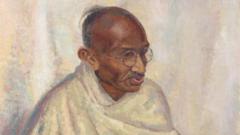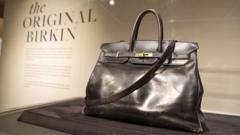The delicate jewels and relics believed to be connected to Buddha's remains are set for auction, prompting legal action from India's Ministry of Culture.
India Raises Concerns Over Auction of Sacred Buddhist Relics

India Raises Concerns Over Auction of Sacred Buddhist Relics
India's government has stepped in to contest the sale of sacred relics originally taken during the colonial era, asserting their rightful ownership.
In 1898, a collection of intricate jewels and relics, believed to have been interred with the Buddha, was excavated during British rule in India. These cultural artifacts are now the subject of a contentious auction organized by Sotheby’s, representing the descendants of the English explorer who unearthed them over a century ago. This situation has triggered a legal response from India's Ministry of Culture, which has called for the return of the objects to India for preservation and respect in religious practices.
This unfolding dispute highlights the broader dialogue surrounding the rightful ownership of artifacts looted during colonial conquests. Ashley Thompson, an art history professor, emphasizes the need to reevaluate the status of culturally significant works, questioning their ownership and commodification in a post-imperial context. Countries around the world have begun addressing similar issues, seen in efforts by U.S. institutions returning items to Indigenous tribes and European museums repatriating artifacts to nations like Nigeria and Sri Lanka.
As this auction stirs debates about cultural heritage and restitution, many ponder the implications of historical injustices in the art world and their lasting effects on the nations once under colonial rule.
This unfolding dispute highlights the broader dialogue surrounding the rightful ownership of artifacts looted during colonial conquests. Ashley Thompson, an art history professor, emphasizes the need to reevaluate the status of culturally significant works, questioning their ownership and commodification in a post-imperial context. Countries around the world have begun addressing similar issues, seen in efforts by U.S. institutions returning items to Indigenous tribes and European museums repatriating artifacts to nations like Nigeria and Sri Lanka.
As this auction stirs debates about cultural heritage and restitution, many ponder the implications of historical injustices in the art world and their lasting effects on the nations once under colonial rule.

















